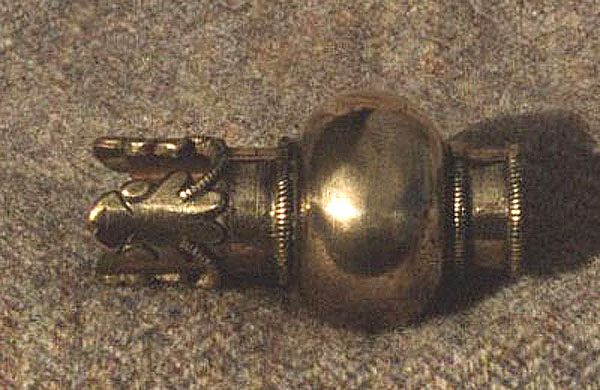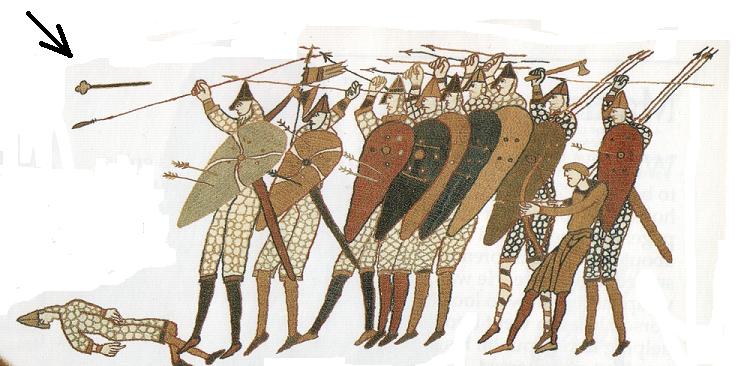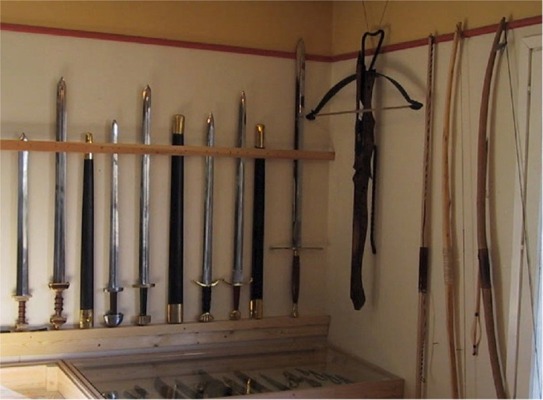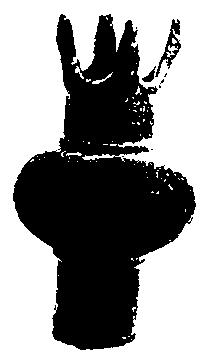Posts: 301 Location: Brisbane, Australia
Sat 11 Feb, 2006 1:47 pm
Viking Maces ?
Here in the land of Oz (not the one in Kansas !) the suppliers called "Manning Imperial" are offering a 'Viking Mace head'. The following is quoted from their e-mail to me........."This one is based on a bronze mace head from Norrkvia, Grotlingbo,
Gotland. Now in the SHM in Stockholm. The information comes from the book Viking Artefacts by James Graham-Campbell."
I dont have this book.....so I guess I'm asking two questions here....1/...does anyone have any other reference of Viking Maces .......2/..or other items that we dont usually associate with vikings ? eg..I have a photo on file of a Viking crossbow.
Thanks !
 Attachment: 68.23 KB
Attachment: 68.23 KB

Posts: 510
Sat 11 Feb, 2006 6:24 pm
Hmmmm..... No, I don't have any reference of any viking maces. But I know of a couple of Bronze Age ones so a vikign age one owuldn't be too far fetched. But I have to see it tyo belive it.
But----- Viking crossbow?!
Posts: 30 Location: Salisbury, Maryland
Sat 11 Feb, 2006 7:38 pm
Here's an interesting picture from the Bayeux Tapestry. Notice the Mace flying through the air at left. These men are obviously on the English side, though.
 Attachment: 57.27 KB
Attachment: 57.27 KB

Posts: 301 Location: Brisbane, Australia
Sat 11 Feb, 2006 7:45 pm
Viking Crossbow Pic.
I'll have to try and find more info.....just know it is on display at a Viking exhibit at a scandanavian museum with both originals and reproductions. I'll post more data asap.....but obviously its from the later Viking period.
 Attachment: 48.55 KB
Attachment: 48.55 KB

Posts: 36 Location: Laconia, NH USA
Sun 12 Feb, 2006 2:32 am
I wouldn't really call that a "viking" crossbow....crossbows were not unheard of after 1000 AD, but their use is more associated with Normans than vikings proper. They were also more of a hunting/sporting weapon than a weapon of war at that time.
As far as the mace head, that replica looked more like a decoration than a weapon. Maces were used as badges of office, especially by the Slavs and indigenous peoples of what eventually became Kiev and Novgorod, so again, I wouldnt exactly call it a "viking" mace. Especially given the fact it was found on Gotland, which is known to be a then international trading crossroads, and located not far from Slavic influence. Speculation on my part, but more grounded in fact than their "viking" claims IMO.
Dave
Posts: 3 Location: North Carolina coast
Sun 12 Feb, 2006 4:50 am
Hi,
I put your question out on several viking re-enactment discussion group lines. Generally what was
referenced(as another person did) is the BayeuxTapestry. There are three scenesor panels showing
weapons which are believed to be maces.
Kim Siddorn, in his book on vikings, discounts maces as a weapon (even though he has a photo of
a mounted reenactor , i.e. Norman, holding one). Siddorn is the head of Regia Anglorum in the UK.
Several feel the use of maces to be more Eastern viking (Byzantium) based than Western viking.
Of course, the viking age could be considered to last up to and just past the Battle of Largs, 1265,
though their time of prominence was past. Maces, war hammers, etc. would have been more
common in medieval warfare by then.
The latest movie on King Arthur showed the invading Saxons carrying crossbows. I had thought
this was cinematic invention generaly believing the crossbow to be a much later weapon, but
apparently they were know from that time period, a well as the general considered Viking Age.
Vikings did use them, but most sparingly. Again, you were more like to find crossbows used by
the Normans (i.e. Norse Men - so yes, viking heritage).
AB Salter
Posts: 36 Location: Laconia, NH USA
Sun 12 Feb, 2006 5:03 am
By the way, that display isn't very impressive if it is indeed from a museum...those are all Ebay wallhangers.
The viking age did NOT last until the 1200s, no matter where you're looking. The time of exploration and settling was long past by then, and the kingdoms that became Norway Sweden and Denmark came into play with central royal authority, no more war bands and petty chiefs...no more epic sea voyages and conquests. The viking age essentially died at
Stamford Bridge...viking dominance of the seas and the continent fell sharply after that.
Youve essentially restated what i just said....maces were more an eastern trend than western european, and crossbows would have been a bit smaller, and in use by Normans, and relegated to a mostly sporting role, with standard bows being far and away more common on the battlefield.
There's simply scant, if any, evidence that 8th-11th century vikings utilized maces and crossbows to any great extent if at all.
The Tapestry isnt a good representation, since it shows these weapons in non viking hands.
Dave
Posts: 3 Location: North Carolina coast
Sun 12 Feb, 2006 9:06 am
additinal information, courtesy of Russ on the Authentic Viking network: he has a Gotlandic mace such as
you described/pictured. Maces, like this, go back to the pre-Celtic age. During the first half of the 10th century,
reign of Haakon the Good, when laws for Western Norway were formulated (Vestland and Trondelag) there is
refernce to maces.
Russ states it should be considered a "badge of rank" rather than a weapon.
Also, while
Stamford Bridge was significant (Dave seems to have an attitude problem) the viking era was
not over in 1066. In 1069 a Danish fleet attacked England. In 1125, The Book of Settlements (Iceland)was
written. Largs, 1265, was not a major battle but it reulted in Isle of Man and the Hebrides being ceded to
Scotland in 1266. 1271 saw the end of the Rus Rurik dynasty. In 1346/47 Markland was visited by viking/
Norse explorers. Not until 1469 did Denmark gie up the Shetlands and Orkneys ending "viking colonization."
AB
Posts: 815 Location: Windsor, Colorado
Sun 12 Feb, 2006 11:07 am
| AlonzaBryan Salter wrote: |
Also, while Stamford Bridge was significant (Dave seems to have an attitude problem) the viking era was
not over in 1066. In 1069 a Danish fleet attacked England. In 1125, The Book of Settlements (Iceland)was
written. Largs, 1265, was not a major battle but it reulted in Isle of Man and the Hebrides being ceded to
Scotland in 1266. 1271 saw the end of the Rus Rurik dynasty. In 1346/47 Markland was visited by viking/
Norse explorers. Not until 1469 did Denmark gie up the Shetlands and Orkneys ending "viking colonization." |
I'm not a moderator or anything of that viariety, but I'm going to comment on this really quickly and hope we can leave it at that. Everyone has differing opinions on a given subject. Our modern idea of what the "Viking Age" is would be completely foriegn to the individuals of that time, as they would not have drawn that kind of distinction, so it may not be possible to determine when it ended. It is going to be a matter of opinion, and sharing opinions is part of how we use this site to educate ourselves. Accusing people of having attitude problems or belittling them with ones response does not contribute to a reasonable discussion where everyone involved can learn something. At the end of the day, you may still disagree, but please try to do so in a polite manner that allows us to keep the nature of this forum both friendly and educational.
-Grey
Last edited by Greyson Brown on Sun 12 Feb, 2006 11:32 am; edited 1 time in total
Posts: 36 Location: Laconia, NH USA
Sun 12 Feb, 2006 11:24 am
Basically my only "problem" was you essentially repeated what I already said...and then did it again:
| Quote: |
| Russ states it should be considered a "badge of rank" rather than a weapon. |
Um...didn't I already say that?
The purpose of discussion is to further that discussion with new information, not restate what's already been posted.
That mace head does not appear to be Scandinavian in origin. It's also dated centuries before the viking age, so, therefore, it is not a "viking" mace.
As for when the viking age ended, I didnt say it ended abruptly with a guillotine slash at 1066 at Stamford Bridge....I said that was the beginning of the end of the Age, and I find it odd you are clinging to dates 2-3 centuries after the generally academically accepted end of the period.
The Norse and vikings are a subject I've been researching and studying for almost 3 years now, so if I seem to come off a little uppity, it's because of the constant barrage of misinformation and ignorance and apathy I come accross on any forum I find related questions in.
I'm blunt, and don't often show tact. It's a character flaw.
Dave
Posts: 9,582 Location: Dayton, OH
Sun 12 Feb, 2006 11:34 am
Dave,
I'm advising you to watch your tone. You're welcome to share your information, but there are better ways to present it than this. While you seem to be knowledgable, people aren't going to want to read posts with this kind of tone, therefore the effect of your shared information can be diminished.
Alonzo,
Your comments about Dave's attitude are also not helpful to this discussion. If you have problems with another poster, contact a moderator. Let's leave the moderating to the Moderators, people.
Posts: 36 Location: Laconia, NH USA
Sun 12 Feb, 2006 12:21 pm
| Quote: |
| people aren't going to want to read posts with this kind of tone, therefore the effect of your shared information can be diminished. |
Point taken Chad.
Posts: 301 Location: Brisbane, Australia
Sun 12 Feb, 2006 3:14 pm
A mace in the face is not the case !?
Gee guys .....didnt mean to stir up such a hot topic (esp on my first subject post) Anyway.....this book.... "Viking Artefacts by James Graham-Campbell." Has anyone got one ? Has anyone read it ?.....what does the author say about this bronze "mace" head ? It prob was a symbol of rank, but has anyone seen the original in the M. of Stockholm ? I cant find any other reference anywhere and some Museums expect us all to just hop on a plane & go and see for ourselves.
Posts: 36 Location: Laconia, NH USA
Sun 12 Feb, 2006 3:36 pm
I just thumbed through a dozen or more of my reference books on the vikings and didnt see a single object like that mace head. The closest things were crozier heads, and neither were shaped like that at all.
I don't have that particular Graham-Campbell book, but there wasn't anything in his other book, "The Vikings" except the crozier heads, one wasn't dated, but was Irish, and the other was 11th century from Iceland.
No viking maces Merv. The one in the Stockholm museum pre-dates the viking age by quite a few centuries from what I understand. Keep in mind just because an artifact is found within Scandinavia, doesn't necessarily mean its "viking".
I've been researching non-typical viking weapons myself, it was Hank Reinhardt's post about viking halberds that prodded me to do so. I'm still looking through the various Sagas (which should not be regarded as Gospel as they were recorded a couple of centuries after they happened, and are only loosely based on actual history) for passages of note, and I look over any carvings that come to light that may illustrate something out of the ordinary...so far, nothing besides halberd references, which are more likely describing a hewing spear rather than a halberd like weapon.
Dave
Posts: 8,310 Location: Montreal,Quebec,Canada
Sun 12 Feb, 2006 6:58 pm
Maybe slightly off topic but in French there are two closely related term dealing with Maces: One called " Masse " which closely relates to metal headed Maces and another term " Massue " which specifically means a heavy knotted wooden club.
In the above discussion there seems to be little or no evidence of Metal headed Viking Maces but I would think that big heavy wooden maces would have been used at the very least when nothing better was available.
In the Bayeux tapestry isn't Bishop Odo armed with a heavy wooden mace " Massue " ???
So, I don't think we can say that Maces of any kind were not used but we can say that metal headed " Maces " were at the very least very rare and at the very least not a widely used weapon.
Well even if we could prove that one Viking warrior used a metal mace or had one made or even a few one-off cases I don't think that this means that Maces are Viking weapons: All sorts of one-offs might have happened throughout history but if one person does something and it doesn't catch on, become a fad or popular it doesn't have much historical meaning.
Posts: 176 Location: Kontiolahti, Finland
Mon 13 Feb, 2006 12:43 am
The second pic Merv sent is from a finnish place.
http://www.rosala-viking-centre.com/ I can't find any references to the mace heads from those pages. It's really not a proper museum, rather what it says it is, a viking center with some artefacts on display.
Posts: 1,757 Location: Storvreta, Sweden
Mon 13 Feb, 2006 1:58 am
It is really a very unique object.
I think the theory of eastern influence/origin is problably correct.
I also think it is possible it is a symbol of rank or "badge of office" of some kind.
I attach a scan of a photocopy of the catalogue card from the Historical Museum in Stockholm.
I think the dragon/beast heads are sitting on the haft side of the head.
In the catalogue there is no known find place for this one.
I would perhaps guess a dating to the 11th C (end of viking perod).
It is not very big. The head is 4 cm across and about 7,5 cm high. The diameter of the haft is max 2 cm, but the hole through the head is smaller.
Does not seem like a serious weapon?
(Many mace heads of bronze from the 12th and 13th C are really very small. Too small to look like killing weapons. They can be of the size of a walnut. Perhaps this is a sign of the mace having some symbolical meaning and was used as a badge of some kind by some official in the period right after the viking age in areas under eastern cultural influence: speculation!)
 Attachment: 9.61 KB
Attachment: 9.61 KB

Posts: 36 Location: Laconia, NH USA
Mon 13 Feb, 2006 4:44 am
I like Jean's interpretation....I can accept wooden clubs and cudgels as being used for weapons...look at the elaborate woodwork on dwellings, ships and other wooden items. I'd feel better if we had pictorial or archeological evidence to support their use, but wood doesnt survive in the ground very well (what we do have we are incredibly fortunate to have) and a club would likely rank down with the lowest strata of society...thralls and the like, so wouldnt make into a grave or be featured on artwork and carvings.
However, a spear is pretty cheap to make, even just a sharpened shaft, and a weapon much more suited to a viking than a club, so I wouldnt imagine clubs were widely used except for hunting for pelts (you dont wanna skewer and tear that nice pelt with spears or arrows!)
I think it's safe to say clubs, maces, hammers, flails and the like were about as common in viking lands and hands as scale and lamellar armour. Possible, somewhat plausible, but really no evidence to support the notion.
I always did find it odd that the hammer didnt find its way into mainstream Norse war gear....Thor being a major deity in their pantheon, hammer pendants found all over Scandinavia and the UK, hammers and mallets figuring quite prominantly in their shipbuilding, but never evolved into a weapon of war. Of course, heavy mass weapons are more suited to attacking rigid armour defenses, and most Norsemen were lightly or non armoured.
Dave
Posts: 301 Location: Brisbane, Australia
Mon 13 Feb, 2006 6:44 am
Original Link to Weapons & Armour Site.
This is the link to the supplier, "Manning Imperial".
http://www.manningimperial.com/ They have some 'unusual' items. A lot of suppliers seem to have the same sort of stuff .... like the same old menu at a Chinese takeaway. But when you study the books there is such a tremendous variety in weapon and armour types.
The 'mace' is under "miscelaneous", but they have very interesting helmets in the "pre-1400" section. Byzantine, Russian full- face, etc.
Posts: 1,576 Location: Bergen, Norway
Mon 13 Feb, 2006 8:56 am
In norway, the viking age is determined (by law!) to end in 1030, with the death of st. Olav Haraldson at Stiklestad. Raiding continued for some time; The truce between the Brikebein and Bagler faction in the early 1200s resulted in now unemployed warriors from both sides mounting an expedition to the Orkneys.
But the army that plundered scottish shores in 1263 wasn't a viking raid. Rather, it was a military campaign of the unified and organized kingdom of Norway.
But there is no hard boundaries, wich is something one often forget. The vikings are not a people. They are scandinavians who live in a time period where armed tourism was seen as a good way to supplement your income.
This is most important in relation with the following early middle ages...
We (or, mosly, I...) favour the joke about the Great Bracer Pyre in 1031, where everyone suddenly realised that fur vests, leather bracers, Kaftans and baggy slavic pants where horribly ugly, and proceded to burn everything, and spread the ashes on the sea, so that no trace would be found of them since...
You
cannot post new topics in this forum
You
cannot reply to topics in this forum
You
cannot edit your posts in this forum
You
cannot delete your posts in this forum
You
cannot vote in polls in this forum
You
cannot attach files in this forum
You
can download files in this forum



